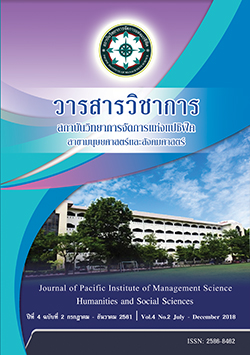Issue Related to the Impeachment of Persons Holding PoliticalPosition and High-Ranking Officers under the Constitution of theKingdom of Thailand (Interim) B.E. 2557
Keywords:
Persons Holding Political Position, High-Ranking Officers under the Constitution, Kingdom of ThailandAbstract
The removal from office measure or impeachment is instrument for monitor and control the exercise of state power in many country ruled by democracy. Impeachment is measure for ensure the legitimacy and legality of the action under the scope of authority of the political appointees and the high officials of state. If individuals have wrongfully, distort, corruption or exploitation that should not be rightful this for themselves or others. Control of state power by the removal from office as a measure aimed at controlling and monitoring individuals who political appointees or senior officials. Impeachment is the review process of political which separated from the court process. The removal from office measure in the Constitution of Kingdom of Thailand, 2550 B. E. (2007), the Constitution of the Kingdom of Thailand (Interim), B.E. 2557 (2014) and the Organic Act on Counter Corruption, B.E.2542 (1999), these laws appeared problem about the removal of a person from the position such as interpretation: authorized removal, claim or cause for removal, initiative and removal process, and the removal of those already vacates office.
The study indicated that: Section 6 of the Constitution of the Kingdom of Thailand (Interim), B.E. 2557 (2014), none clear specified about the National Legislative Assembly for authorized to removals. Section 270 of the Constitution of Kingdom of Thailand, 2550 B. E. (2007) and the Organic Act on Counter Corruption, B.E.2542 (1999), These laws stipulates about cause of removal when persons having become unusually wealthy indicative of possible commission of corruption, malfeasance in office or malfeasance in judicial office, or for an intentional exercise of power contrary to the provisions of the Constitution or law, or for serious violation, or non-compliance with the ethnical standard. All of the above allegations have unclear for legal interpretation such as unusually wealthy. Section164 and 271 of the Constitution of Kingdom of Thailand, 2550 B. E. (2007) and section 59 of the Organic Act on Counter Corruption, B.E.2542 (1999), limited to just two traits can initialed the process of removal: a. eligible voters of no fewer than 20,000 can sign a petition to the President of the Senate to have a person removed from office or Members of the House of Representatives of not less than one-fourth of the existing members of the House have the right to lodge with the President of the Senate a complaint requesting the Senate to pass a resolution to remove a person from office.
Therefore, should amend the law to increase the power of the Senate, or other organizations authorized to initiative the removal process. Section 270 of the Constitution of Kingdom of Thailand, 2550 B. E. (2007) and article 59 of the Organic Act on Counter Corruption, B.E.2542 (1999), does not prescribe the details about the removal of who vacates office resulted problem of statutory interpretation.
References
Downloads
Published
Issue
Section
License
บทความที่ได้รับการตีพิมพ์เป็นลิขสิทธิ์ของ สถาบันวิทยาการจัดการแห่งแปซิฟิค
ข้อความที่ปรากฏในบทความแต่ละเรื่องในวารสารวิชาการเล่มนี้เป็นความคิดเห็นส่วนตัวของผู้เขียนแต่ละท่านไม่เกี่ยวข้องกับสถาบันวิทยาการจัดการแห่งแปซิฟิค และคณาจารย์ท่านอื่นๆในสถาบันฯ แต่อย่างใด ความรับผิดชอบองค์ประกอบทั้งหมดของบทความแต่ละเรื่องเป็นของผู้เขียนแต่ละท่าน หากมีความผิดพลาดใดๆ ผู้เขียนแต่ละท่านจะรับผิดชอบบทความของตนเองแต่ผู้เดียว







